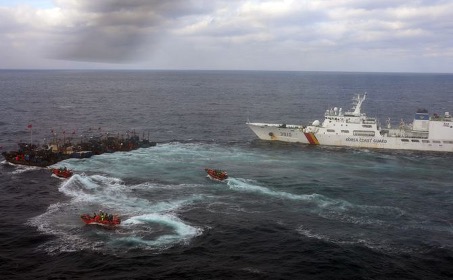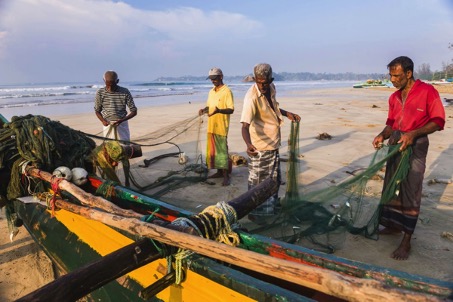The economics and geopolitics of global fisheries
Overfishing is a global environmental and economic problem that resists administrative solutions. Giving control to local stakeholders would help.

In a nutshell
- Ocean fish are an example of “the tragedy of the commons’
- A third of seas and ocean waters are overfished, 60 percent fully exploited
- Administrative solutions to unsustainable fishing have largely failed
- Right-based schemes empowering fishing communities offer more hope
One natural resource that was once plentiful but has now been declining for decades is ocean fish. The figures are alarming. According to a report by the Food and Agriculture Organization (FAO), 31 percent of global stocks are fished at biologically unsustainable levels (overfished), while 58 percent are fully exploited.
In consequence, ocean and sea catches have stagnated for three decades, at about 85 million tons a year, with some fisheries having experienced a sharp decline in both the quantity and quality of catches. Water pollution along coastal areas is part of the explanation, but the main culprit is overfishing.
In response to increasing global demand, about half of the fish consumed by humans today now comes from aquaculture (ironically, these farmed fish are mostly fed with small ocean fish). The growing scarcity of fish in the world’s oceans is creating a food-security issue, since hundreds of millions of people rely on fish for their daily protein intake.
More than 35 million depend directly on fishing for their livelihoods, and many more in processing and related industries. Competition over scarce natural resources usually generate geopolitical tensions between countries, and fish are no exception.
Resource conflicts
Conflicts over fisheries can be intense. The “cod wars” pitting Iceland against the United Kingdom in the 1950s, 1960s and 1970s for control of North Atlantic fishing grounds are one famous example. But globalization and the rise of developing countries, with their enormous hunger for fish, have made the issue even more acute.
Illegal fishing is threatening the livelihoods of local fishermen, especially in East Africa. The rise of piracy in these regions, especially in Somalia, can be linked to the need for an alternative source of income. Morocco has fishing agreements with the European Union, but disputes between local and Spanish fishermen are still common. Tempers are also running high in the Palk Strait, where Sri Lankan fishing communities claim that stocks are being exhausted by intense trawling from the Indian side. Indonesia regularly impounds and blows up trawlers found illegally fishing in its waters. And the list goes on.
Overfishing draws the fleets of larger countries to seek untapped resources in the waters of weak or failed states.
The most frequently cited culprit is China, which controls the world’s largest fishing fleet. Since their own home waters are overfished, Chinese fishing fleets push the limits and are frequently caught operating in the territorial waters and exclusive economic zones of other countries, from North Korea to Indonesia and even Argentina.
In some cases, local coast guard and naval vessels have fired upon and sunk fleeing trawlers. In some bodies of water – the South China Sea, for example – fishing rights may be even more hotly contested than the right to explore and develop oil and gas deposits.
Another geopolitical consequence of overfishing is that it encourages the fishing fleets of larger countries to search for untapped resources in the waters of weak or failed states. This is especially frequent in Africa, where bribing of local authorities is common, fueling corruption and bolstering the suboptimal status quo.
Common tragedy
Ocean fish are an example of “the tragedy of the commons,” a classic economic problem examined in a previous report on Africa’s poaching wars. When resources are freely available and unowned, users have an incentive to exploit them as quickly and intensively as possible before others do the same. The aggregation of such behaviors leads to rapid depletion of the resource.
Many environmental problems can be seen in this light, ranging from deforestation and water pollution to elephant poaching and overgrazing. The absence of a long-term stake linked to ownership fosters shortsightedness in resource use. Similarly, open access to seas and oceans contributes to overfishing behavior. According to a 2016 World Bank study, the mismanagement of world fisheries resulted in economic losses of $83 billion in 2012 (mostly from higher costs and smaller catches due to depressed fish stocks).
International waters are an obvious case. Although fishing grounds on the high seas are “managed” by various Regional Fishery Management Organizations (RFMO) under treaties and conventions, especially the United Nations Convention on the Law of Sea (UNCLOS), resources in these waters are still available “on demand.” RFMOs assess stocks and the total allowable catch on an annual basis, distributing quotas per member according to diverse and often contradictory criteria. As new countries join (usually emerging nations interested in rapid harvesting rather than conservation), each older member’s fishing quota is reduced.
Shorter fishing seasons can exacerbate the problem by encouraging risk-taking and dumping of unwanted catch.
For example, the International Commission for the Conservation of Atlantic Tunas (ICCAT) expanded from eight member countries in 1969 to 51 in 2016, placing increasing and obvious pressure on tuna stocks. Under such conditions, incentives to take a long-term view of resource management are weakened. Fishermen and political advocates of the industry spend their time lobbying for more relaxed rules, while incentives to fish illegally grow.
The situation is not much better within the 200-mile “exclusive economic zones” or even the territorial waters of many countries. These areas are still often treated as a “commons,” even when they are made available only to a few selected participants.
Regulating access through shorter fishing seasons, for instance, can exacerbate the problem. To get their haul as soon as possible, fishermen use bigger boats, more powerful engines and wider nets. Shorter seasons encourage risk-taking and shortcuts on safety, as fishermen seek to take advantage of rapid swings in market supply, prices and income.
In the process, trawling techniques evolved to win the “race to fish” have themselves contributed to increasing scarcity. They also have other unfortunate effects, such as the dumping of “bycatch” – unwanted fish or other species that are discarded, polluting the water and wrecking the marine ecosystem that produces the organisms fish feed on.
Market distortion
Other regulations designed to counter these effects and combat overfishing have included size limits on boats, nets, engines or catch volumes. There have been restrictions on fishing permits and even buyback schemes, which have not met with much success.
The paradox here is that such policies often encourage short-termist behavior. A particular target of criticism – coming from industry specialists, think tanks and groups like Greenpeace – has been government subsidies granted to the fishing industry. Up to $35 billion each year is earmarked for this purpose, two-thirds coming from the developed countries.
The main problem with subsidies is that they provide very bad incentives. By lowering the cost of fishing, they encourage overcapacity and thus overfishing (although sometimes fishermen are paid not to fish). The World Trade Organization estimates that 60 percent of these subsidies end up being detrimental to fish stocks.

Without subsidies, declining fish stocks would mean lower income and greater losses for fishermen. Eventually, this would lead to fewer boats on the seas, helping fish stocks recover. This natural economic cycle is broken by subsidies, which are generally granted through lobbying efforts. The result is to support activities that are economically and ecologically unsustainable.
Given the “trade-distorting” aspect of this problem, the WTO naturally introduced fishing subsidies as a topic back in 2001. It is now holding intense discussions about new rules, which were discussed at its latest Ministerial Conference in Buenos Aires in mid-December. Some countries want to cut back subsidies, notably WTO members informally called the “Friends of Fish” (including Argentina, New Zealand, Iceland, Pakistan and the United States, among others).
Others, especially in Asia, want to maintain fishing fleets and catches.
The fate of fishing subsidies within the WTO depends most of all on China. In November, Beijing proposed cutting subsidies for illegal, unreported and unregulated fishing. But this proposal specifically exempted developing countries and disputed waters.
Moreover, the legality of fishing would be decided not by independent experts or international bodies, but by national governments and regional fishing organizations. This is probably too much to expect other members to swallow.
Making any WTO deal harder to strike was a U.S. counterproposition to expand the definition of subsidies to include support for aquaculture. The world’s largest producer of farmed fish is China. Thus, the two global superpowers are now squaring off at the WTO over the geopolitics of fish.
Sea stakes
Even an end to subsidies would probably not be enough to give fishermen a stake in the long-term preservation of stocks. One option might be right-based reforms, including community-based fishing. The model could be taken from the work of Nobel Prize-winning economist Elinor Ostrom, who proposed consolidating “Common Pool Resources” (such as irrigation systems in Spain or pastures in some Alpine valleys) in the hands of local stakeholders.
They would manage and monitor such resources, enforcing their exclusive common rights over it. This kind of institutional design, buttressed with certain conditions about resource ownership responsibilities, have proven to be economically and environmentally sustainable, because they provide built-in incentives to think in the long term.
Institutional reforms are often seen as the privatization of what is seen as a common good – the oceans.
Some experts advocate individual transferable quotas (ITQ) or “catch shares” as a means of enhancing efficiency and sustainability. This system has been implemented in New Zealand and Iceland, for example. Every season, scientists assess the fish stock. Authorities then set the total allowable catch, which is divided up into “quotas” or “shares” for individual fishermen, boats or companies.
Catch shares also provide incentives for a long-term approach to managing fish stocks. Because they are transferable, the shares are a form of capital that one can make grow. They can also be traded, allowing reallocation to more efficient fishermen, encouraging the consolidation of fleets and reducing overcapacity.
These measures reduce pressure to enter the “fish race,” allowing fishermen to pay more attention to safety as time constraints are removed. They also tend to reduce price volatility, stabilizing and increasing incomes. Fish stocks are less stressed and decline and discard rates fall.
Scenarios
Reform scenarios
Are such institutional reforms the future of fishing? Several obstacles must first be overcome. One is that these measures, especially ITQs, are often seen as “privatizing” what is typically regarded as a common good – the oceans. As in other industries, this spurs ideological resistance to privatization.
Secondly, it is true that ITQs foster business concentration, which is a form of inequality. Consolidation also puts some fishermen out of business and thus creates a natural constituency against change. This means an ITQ-based reform could fail if it does not include a strategy for helping displaced fishermen and protecting small-scale operators. This latter could be accomplished through a “fair” initial allocation of quotas and an insistence that only active fishermen can own quotes – not some financial “quota barons” or “sea lords” intent on accumulating potential monopoly power.
A third obstacle derives from public-choice considerations. We should naturally expect fishing organizations wishing to continue enjoying the ocean “commons” to lobby against ITQs. Countries with hegemonic geopolitical ambitions will also tend to oppose any reduction of open access to the seas.
Finally, property rights to large, high-seas fisheries will be more complex to define and enforce.
This makes the most likely scenario one of piecemeal reform. Rights-based measures will be introduced where local conditions allow. Elsewhere, the status quo will prevail, with perhaps more restrictions to curb overfishing. The probable outcome of such half-measures is more illegal fishing and more tensions as resource depletion continues.






